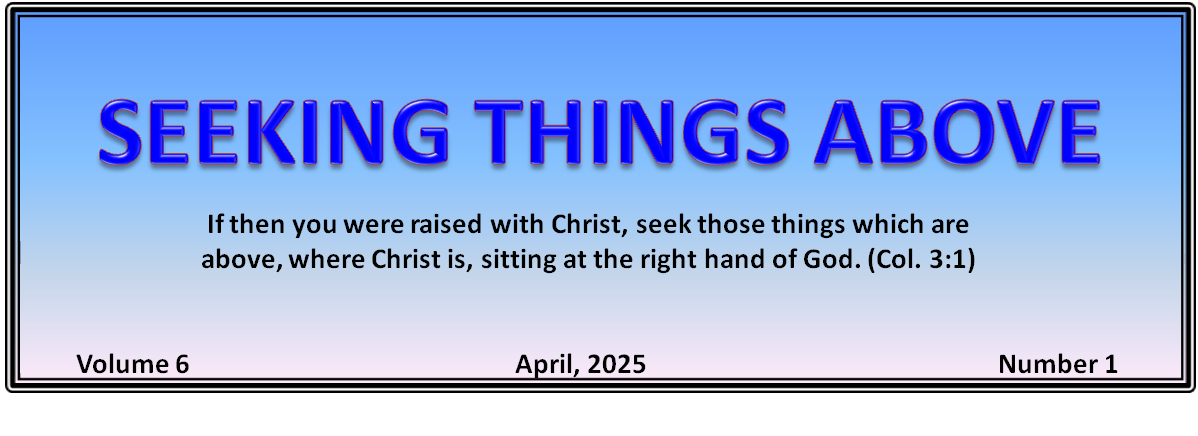
Going to a Funeral?
Mark White
 “IT IS BETTER TO GO TO THE HOUSE OF MOURNING THAN TO GO TO THE HOUSE OF FEASTING: for this is the end of all men, and the living will lay it to heart. Sorrow is better than laughter, for by sadness of countenance the heart is made glad. The heart of the wise is in the house of mourning; but the heart of fools is in the house of mirth.” (Ecclesiastes 7:2-4)
“IT IS BETTER TO GO TO THE HOUSE OF MOURNING THAN TO GO TO THE HOUSE OF FEASTING: for this is the end of all men, and the living will lay it to heart. Sorrow is better than laughter, for by sadness of countenance the heart is made glad. The heart of the wise is in the house of mourning; but the heart of fools is in the house of mirth.” (Ecclesiastes 7:2-4)
How many trips have we had to make to a cemetery or funeral chapel? Are they more than we would like to count? As we get older, it seems we go more often. Admittedly, birthday parties are more fun. Invitations to occasions of laughter and joy are more readily accepted than to a period of somber reflection at a funeral service. But Solomon’s wisdom says that it is better for us to go to the house of mourning than to the house of mirth. Why is this? Was Solomon preoccupied with morbidity, or did he learn something in his quest for wisdom we need to know also? With every funeral we attend, we learn something. Take a moment and consider the lessons learned in the “school” of mourning.
We are moving closer and closer to eternity. Time is rapidly fleeting by us all. Each day brings us closer to our own eternal destinies. This world is not all there is. As the old song says, “We are going down the valley, one by one.” We are forced to face the real issues of life. No one can really avoid this lesson in the house of mourning. At death, do possessions really matter? Is wealth, fame, power, or control important when they have all been laid down in the end? A party can help us escape reality; funerals make us face it.
We learn to make good use of our time. Minutes, hours, days, months, years — these are the ways we measure life on earth. Time is precious. We are never ready to lose those whom we love no matter how long they have been with us. Life is a loan from God, and it must be repaid. When life is gone, it is gone. To paraphrase Paul, “Make the most of your time.” (Ephesians 5:16)
We realize that others hurt, too. We often become so absorbed in our own problems, sufferings, and hurts that we forget there are other hurting people in this world. A party atmosphere deceives us into thinking everyone is having fun! In the house of mourning, we see others who hurt. It makes us serious about helping where we can, when we can.
We teach our children about death at funerals. It is surprising how many teenagers have never attended a funeral. Their parents shield them from it and then when death comes to someone close to them, they are totally unfamiliar with it. We prepare our children to live, but we should also prepare them to die. It may not be a walk in the park, but a funeral is good for young people, too.
Funerals are cultural events where some great life and death lessons can be observed. A funeral itself is not an essential event, but dealing with a death is most certainly necessary. Let’s not shy away from the house of mourning. It’s good for us.
________
Trying to Adapt the Church to Everybody
Sewell Hall
 I was never an avid baseball fan and living in Atlanta has done little to convert me. One 4th of July, however, I did agree to go with a group of Christian friends to a Braves game. From the time we arrived at the field, I knew this was going to be different. The field was covered with performing high school bands – an appeal to all who like music. And that was only the beginning. For those preferring opera, a Metropolitan Opera star sang the national anthem. For those more political in taste, the Attorney General of the United States led the pledge to the flag. Lovers of money were tantalized by a $500 door prize.
I was never an avid baseball fan and living in Atlanta has done little to convert me. One 4th of July, however, I did agree to go with a group of Christian friends to a Braves game. From the time we arrived at the field, I knew this was going to be different. The field was covered with performing high school bands – an appeal to all who like music. And that was only the beginning. For those preferring opera, a Metropolitan Opera star sang the national anthem. For those more political in taste, the Attorney General of the United States led the pledge to the flag. Lovers of money were tantalized by a $500 door prize.
Cartoon fans were entertained by a million-dollar scoreboard featuring cartoon characters. Those living on the level of the flesh were treated to the sight of a young lady in short shorts running around the diamond sweeping off the bases between every inning. And to climax it all, there was a huge fireworks display. I don’t remember what team the Braves were playing, much less who won, but that was a game I shall never forget. That was baseball for people who don’t like baseball.
Far too many churches are trying to remodel the religion of Jesus Christ to make it a religion for people who don’t like religion. For those desiring recreation, they offer recreation. For those desiring entertainment, there is entertainment. For those whose primary interest is secular education, they offer day care, kindergartens, schools, and colleges. For those whose appetite is for food, they build church kitchens and dining rooms. The attempt is to be “the church for everybody.”
Such carnal, temporal appeals were never authorized by the Lord. He intended that the church be a “called out,” separated body of people. If the gospel is the only appeal, it will make that separation.
Walking in the Light
__________
My Rock & My Fortress
(Psalm 31:2-3)
Mike Johnson
In Psalm 31:2-3, David appeals to God, saying, “. . . Be my rock of refuge, a fortress of defense to save me. For You are my rock and my fortress; therefore, for Your name’s sake, lead me and guide me.”
The word “rock” is used figuratively in various places in the Scriptures to describe God. The writers refer to Him as the “rock of my salvation,” “a rock or refuge,” or simply a “rock.” As might be expected, the term is primarily used in the book of Psalms, which is a book of poetry and uses figurative language. In another Psalm, for instance, David wrote, “The Lord is my rock and my fortress and my deliverer; my God, my strength, in whom I will trust; my shield and the horn of my salvation, my stronghold” (18:2).
However, the use goes beyond Psalms. Moses, for example, referred to God as a “rock” several times in Deuteronomy 32 in what is known as “The Song of Moses.” In verses 3-4, he exclaims, “For I proclaim the name of the Lord: Ascribe greatness to our God. He is the Rock, His work is perfect; For all His ways are justice, A God of truth and without injustice; Righteous and upright is He . . . .” Also, Hannah spoke of God, saying, “No one is holy like the Lord, For there is none besides You, Nor is there any rock like our God” (1 Sam. 2:2). Elsewhere, in 2 Samuel 22:2-3, again, David composed a song on the day when he was delivered from all his enemies and from Saul, in which he said God was his “rock” and “fortress.” In some of his final words, he referred to God as “the Rock of Israel” (2 Sam. 21:3).
What does this figure of speech (metaphor) mean? The idea is that God is like a rock––He is like a fortress. A rock is durable and stable; strong forts were built of stones, providing protection. Thus, God was his protector, his strength, and his refuge. Today, people can have the same relationship with God. Is God your rock and your fortress?
__________
Daddy, Who Left the Lights On?
Passing the church building one Sunday evening where they attended morning worship, two “Christian” parents’ little girl exclaims, “daddy, somebody left the lights on. We should stop and turn them off.”
The parents drove on in silence. Later, at home, they decided they had better start attending evening worship. Not only to satisfy the curiosity of their little daughter, but their own consciences as well.
If you passed the church building on Sunday or Wednesday evenings, would your children wonder who left the lights on?
Congregations have coaxed, persuaded, tantalized and rewarded, trying to get church members to attend worship. They have tried banners, seals, diplomas, potluck dinners, and attendance drives, trying to induce people to do what they would do anyway if they really loved God and his Son.
But people go where they want to go, because where their hearts are, their heels will follow. When we get out hearts right with God, then all these other things will not be necessary to try and get people to attend worship as they should. When our hearts are right there will be more feet in the church building on Sunday and Wednesday.
If You Drove By The Church Building on Sunday or Wednesday Night, Would Your Child Ask The Same Question?
From Meditations on Truth
__________
Build Wisely
An elderly carpenter was ready to retire. He told his employer-contractor of his plans to leave the house-building business and live a more leisurely life with his wife enjoying his extended family. He would miss the paycheck, but he needed to retire. They could get by. The contractor was sorry to see his good worker go and asked if he could build just one more house as a personal favor. The carpenter said yes, but in time it was easy to see that his heart was not in his work. He resorted to shoddy workmanship and used inferior materials. It was an unfortunate way to end a dedicated career.
When the carpenter finished his work the employer came to inspect the house. He handed the front-door key to the carpenter. “This is your house,” he said, “my gift to you.” The carpenter was shocked! What a shame! If he had only known he was building his own house, he would have done it all so differently. So it is with us. We build our lives, a day at a time, often putting less than our best into the building. Then with a shock we realize we have to live in the house we have built. If we could do it over, we’d do it much differently. But we cannot go back. You are the carpenter. Each day you hammer a nail, place a board, Or erect a wall. “Life is a do-it-yourself project,” someone has said. Your attitudes and the choices you make today build the “house” you live in tomorrow.
Build wisely!
____________________________________________
Sermon Audio
Sermons by Charles Maples
====================================================
Editor: Mike Johnson
www.seekingthingsabove.org

